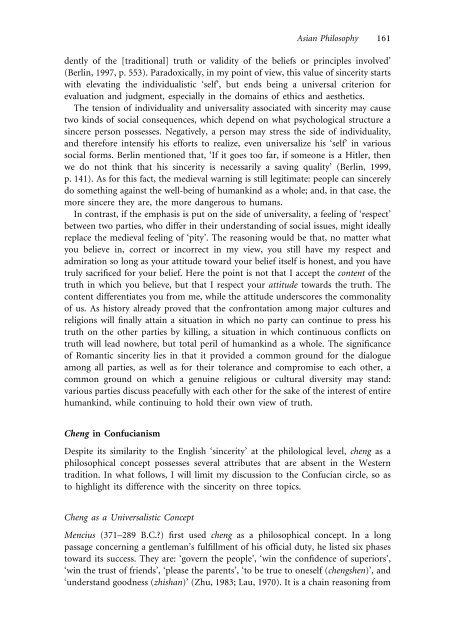Western sincerity and Confucian Cheng
You also want an ePaper? Increase the reach of your titles
YUMPU automatically turns print PDFs into web optimized ePapers that Google loves.
Asian Philosophy 161<br />
dently of the [traditional] truth or validity of the beliefs or principles involved’<br />
(Berlin, 1997, p. 553). Paradoxically, in my point of view, this value of <strong>sincerity</strong> starts<br />
with elevating the individualistic ‘self’, but ends being a universal criterion for<br />
evaluation <strong>and</strong> judgment, especially in the domains of ethics <strong>and</strong> aesthetics.<br />
The tension of individuality <strong>and</strong> universality associated with <strong>sincerity</strong> may cause<br />
two kinds of social consequences, which depend on what psychological structure a<br />
sincere person possesses. Negatively, a person may stress the side of individuality,<br />
<strong>and</strong> therefore intensify his efforts to realize, even universalize his ‘self’ in various<br />
social forms. Berlin mentioned that, ‘If it goes too far, if someone is a Hitler, then<br />
we do not think that his <strong>sincerity</strong> is necessarily a saving quality’ (Berlin, 1999,<br />
p. 141). As for this fact, the medieval warning is still legitimate: people can sincerely<br />
do something against the well-being of humankind as a whole; <strong>and</strong>, in that case, the<br />
more sincere they are, the more dangerous to humans.<br />
In contrast, if the emphasis is put on the side of universality, a feeling of ‘respect’<br />
between two parties, who differ in their underst<strong>and</strong>ing of social issues, might ideally<br />
replace the medieval feeling of ‘pity’. The reasoning would be that, no matter what<br />
you believe in, correct or incorrect in my view, you still have my respect <strong>and</strong><br />
admiration so long as your attitude toward your belief itself is honest, <strong>and</strong> you have<br />
truly sacrificed for your belief. Here the point is not that I accept the content of the<br />
truth in which you believe, but that I respect your attitude towards the truth. The<br />
content differentiates you from me, while the attitude underscores the commonality<br />
of us. As history already proved that the confrontation among major cultures <strong>and</strong><br />
religions will finally attain a situation in which no party can continue to press his<br />
truth on the other parties by killing, a situation in which continuous conflicts on<br />
truth will lead nowhere, but total peril of humankind as a whole. The significance<br />
of Romantic <strong>sincerity</strong> lies in that it provided a common ground for the dialogue<br />
among all parties, as well as for their tolerance <strong>and</strong> compromise to each other, a<br />
common ground on which a genuine religious or cultural diversity may st<strong>and</strong>:<br />
various parties discuss peacefully with each other for the sake of the interest of entire<br />
humankind, while continuing to hold their own view of truth.<br />
<strong>Cheng</strong> in <strong>Confucian</strong>ism<br />
Despite its similarity to the English ‘<strong>sincerity</strong>’ at the philological level, cheng as a<br />
philosophical concept possesses several attributes that are absent in the <strong>Western</strong><br />
tradition. In what follows, I will limit my discussion to the <strong>Confucian</strong> circle, so as<br />
to highlight its difference with the <strong>sincerity</strong> on three topics.<br />
<strong>Cheng</strong> as a Universalistic Concept<br />
Mencius (371–289 B.C.?) first used cheng as a philosophical concept. In a long<br />
passage concerning a gentleman’s fulfillment of his official duty, he listed six phases<br />
toward its success. They are: ‘govern the people’, ‘win the confidence of superiors’,<br />
‘win the trust of friends’, ‘please the parents’, ‘to be true to oneself (chengshen)’, <strong>and</strong><br />
‘underst<strong>and</strong> goodness (zhishan)’ (Zhu, 1983; Lau, 1970). It is a chain reasoning from


